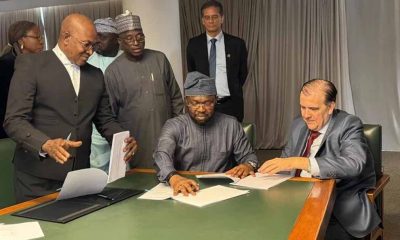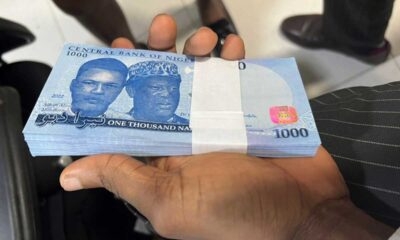Business
IMF PREDICTS NIGERIA’S ECONOMY WILL CONTRAST BY 4.3%

The International Monetary Fund (IMF) has revised its 2020 gross domestic growth projections for the Nigerian economy.
In its October World Economic Outlook report released in Washington on Tuesday, the IMF projected that Nigeria’s economy would contract by 4.3 per cent in 2020 in real terms.
This is a 1.1 per cent improvement from the 5.4 per cent that was projected in June and deeper than the 3.4 per cent projected in April.
The Washington-based institution projected that the economy would recover in 2021 by 1.7 per cent.
Gita Gopinath (pictured), IMF chief economist and director of the research department, said oil-exporting countries are battling the health and economic impact of the COVID-19 pandemic and the impact of low oil prices.
“They have been hit by the health crisis and they have been hit because they are oil exporters which had a collapse and more importantly, they just don’t have the resources that advanced economies have to deal with this crisis,” Gopinath said.
“Because we don’t have a financial crisis at this point, many emerging markets are able to borrow at record levels in foreign currency this year relative to previous years.”
The IMF chief economist said the foreign debts been acquired by emerging market economies will not be enough and advised that there is a need for continued international support.
This support, Gopinath explained, could be in terms of concessionary financing, aid and debt relief and restructuring.
“There are going to be developing and low-income economies that would need debt relief and, in some cases, restructuring of debt to make sure they have the space to do the spending that they need,” she said.
This contraction will be the worst recession in 37 years, and the second recession in five years, following closely after a negative economic growth of 1.58 per cent in 2016.
Business
Nigeria’s foreign reserves records marginal increase, now $40.88bn – Cardoso

Nigeria’s foreign reserves records marginal increase, now $40.88bn – Cardoso
Nigeria’s foreign reserves rose to $40.88 billion as of November 21, the Governor of the Central Bank of Nigeria (CBN), Olayemi Cardoso, has said.
Cardoso disclosed this on Tuesday at a press conference after the Monetary Policy Committee’s 298th meeting in Abuja.
He said the external reserves grew from $40.06 billion at the end of October to $40.88 billion in November.
The amount represents an increase of $82 million or 2.05 per cent in 21 days.
“The external reserves rose marginally to 40.88 billion as of 21 November 2024, from 40.06 billion at the end of October 2024, available to finance 17 months of imports,” he said.
However, from the apex bank’s website, the increase in Nigeria’s foreign reserves showed $40.27 billion on November 22.
Cardoso also said, “The process of getting us where we are in terms of reserves has been a long one”.
“It is a clear indication that the policies we have put in place are certainly yielding fruits,” he added.
“However, and it’s very important to make a distinction here and to reiterate the fact that reserves are there for a multiplicity of different purposes, not least of which is to create buffers in the event of unanticipated shocks.
“So they are not there to simply whittle away. They are there to be used to more or less defend yourself where that becomes necessary
“And when we talk about shocks that are not anticipated, I think we can see how the global economies are.”
Cardoso also said the bank would continue to intensify efforts to stabilise the currency and prices.
The CBN governor said, “The currency has been stable compared to what it was in June”.
But he said for the value of the country’s currency to be stable, there must be increased exports and diversification of the economy.
Cardoso said diaspora remittance had increased due to policies put in place.
He commended those in the diaspora for helping the country accomplish over $600 million in remittances.
Business
Naira rises to N1,755/$ in parallel market

Naira rises to N1,755/$ in parallel market
The Naira yesterday appreciated to N1,755 per dollar in the parallel market from N1,770 per dollar on Monday.
Similarly, the Naira appreciated to N1,659.44 per dollar in the Nigerian Autonomous Foreign Exchange Market, NAFEM.
Data from FMDQ showed that the indicative exchange rate for NAFEM fell to N1,659.44 per dollar from N1,675.62 per dollar on Monday, indicating N16.18 appreciation for the naira. The volume of dollars traded (turnover) increased by 219.5 percent to $425.98 million from $108.79 million traded on Monday.
READ ALSO:
- Nigeria Customs returns 21 stolen luxury vehicles to Canada
- Pro-Wike Rivers lawmakers move to prevent probe of FCT minister tenure as governor
- Bianca raises hope Tinubu will free Nnamdi Kanu to restore peace in South-East
Consequently, the margin between the parallel market and NAFEM rate narrowed to N95.56 per dollar from N117.38 per dollar on Monday.
Naira rises to N1,755/$ in parallel market
Business
PH refinery to blend 1.4-million litre petrol daily – NNPC

PH refinery to blend 1.4-million litre petrol daily – NNPC
Rehabilitated old Port Harcourt refinery is currently operating at 70 per cent of its installed capacity, the Nigerian National Petroleum Company Limited has said.
The Port Harcourt Refining Company (PHRC) operates two refineries: the old refinery with a capacity of 60,000 barrels per stream day (bpsd) and a new refinery with an installed capacity of 150,000 bpsd.
The NNPCL in a statement on Tuesday, said it planned to increase the operation to 90 per cent of the refinery’s capacity.
“The Board and Management of the Nigerian National Petroleum Company Limited (NNPC Ltd) express heartfelt appreciation to Nigerians for their support and excitement over the safe and successful restart of the 60,000 barrels-per-day Old Port Harcourt Refinery,” the statement reads.
“This achievement marks a significant step forward after years of operational challenges and underperformance.
“We are, however, aware of unfounded claims by certain individuals suggesting that the refinery is not producing products. For clarity, the Old Port Harcourt Refinery is currently operating at 70% of its installed capacity, with plans to ramp up to 90%.”
According to NNPC, the refinery has commenced production of daily outputs of straight-run petrol (naphtha), which is blended into 1.4 million litres of petrol.
The national oil company said the refinery has also started producing 900,000 litres of kerosene per day and 1.5 million litres per day of diesel.
The NNPC said 2.1 million litres daily volume of low-pour fuel oil (LPFO) would also be produced at the refinery, adding that additional volumes of liquefied petroleum gas (LPG) will be refined at the plant.
“It is worth noting that the refinery incorporates crack C5, a blending component from our sister company, Indorama Petrochemicals (formerly Eleme Petrochemicals), to produce gasoline that meets required specifications,” NNPC said.
“Blending is a standard practice in refineries globally, as no single unit can produce gasoline that fully complies with any country’s standards without such processes.”
Additionally, the NNPC said it has made substantial progress on the new Port Harcourt refinery, “which will begin operations soon without prior announcements”.
“We urge Nigerians to focus on the remarkable achievements being realized under the able and progressive leadership of President Bola Tinubu and to support efforts aimed at delivering more dividends to the nation,” the energy firm said.
According to the statement, malicious attacks on “clear progress” only undermine the “significant strides made by NNPC Ltd and the country”.
-

 metro24 hours ago
metro24 hours agoBREAKING: Port Harcourt refinery begins operation
-

 Business3 days ago
Business3 days agoJust in: Dangote refinery reduces petrol price for marketers
-

 metro2 days ago
metro2 days ago40-foot container falls on car in Lagos
-

 Politics3 days ago
Politics3 days ago2027: Lagos Speaker, Obasa joins gov race, may battle Seyi Tinubu, others
-

 Politics2 days ago
Politics2 days agoLagos 2027: Seyi Tinubu campaign team releases his life documentary
-

 International2 days ago
International2 days agoTrump to sack 15,000 transgender officers from U.S. military: Report
-

 Education16 hours ago
Education16 hours agoUS University opens 2025 scholarships for international students
-

 Entertainment2 days ago
Entertainment2 days agoPolygamy best form of marriage for Africa – Okey Bakassi















You must be logged in to post a comment Login